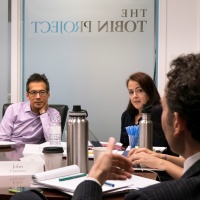Tobin Convenes Scholars for Meeting on When Democracy Breaks

On September 6th, the Tobin Project convened ten political scientists, historians, and international relations scholars for the inaugural meeting of our research inquiry on When Democracy Breaks. This project seeks to explore past incidents of democratic collapse and identify the factors that led to decline. By investigating moments of democratic crisis, we hope to gain a better understanding of why democracies fail and how to sustain a robust democracy over time.
Meeting participants shared and workshopped research proposals on nine cases of democratic breakdown, including:
- Athens between 413 and 403 BCE
- The U.S. South in the lead-up to the Civil War
- Weimar Germany
- Japan in the 1930s
- Cold War-era Czechoslovakia
- 1970s Argentina
- The 1973 Chilean coup d’état
- Russia throughout the 1990s and early 2000s
- Contemporary Turkey
Proposals examined the core factors that led to democratic collapse in each case, and discussion was aimed at identifying recurring themes across the historical episodes. We are excited by the focus and rigor of the projects presented and are especially grateful for the guidance of the initiative’s scholar-leaders: Archon Fung (Winthrop Laflin McCormack Professor of Citizenship and Self-Government, Harvard Kennedy School), David Moss (Paul Whiton Cherington Professor of Business Administration, Harvard Business School), and Arne Westad (S.T. Lee Professor of U.S.-Asia Relations, Harvard Kennedy School).
We look forward to convening additional discussions around this topic and plan to publish the cases, potentially as an edited volume. At a moment when understanding threats to democracy seems especially pressing, we hope that this inquiry might encourage further research on this important topic and meaningfully engage scholars, students, and policymakers in building a deeper understanding of how democracy works and what we can do to protect it.

